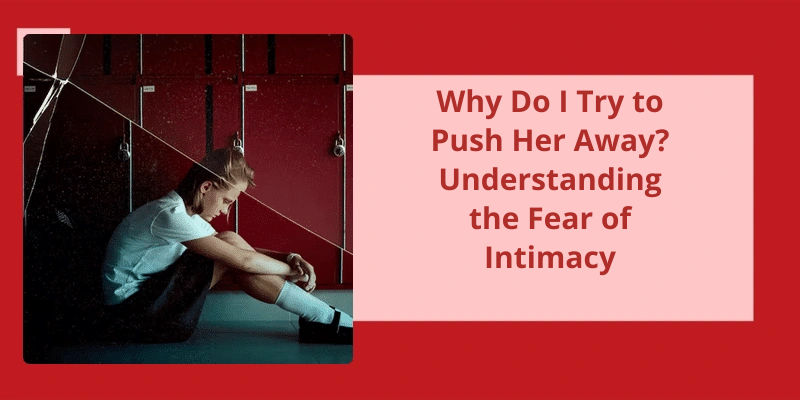It could be a reflection of our own insecurities or fears of inadequacy, and we may push people away in an attempt to protect our own self-image. Regardless of the underlying reasons, it's important to recognize when we’re engaging in this behavior and work to overcome it in order to build healthier and more fulfilling relationships. Sometimes, seeking therapy or counseling can be helpful in understanding and addressing these patterns of behavior. Ultimately, learning to be vulnerable and open with others can lead to deeper connections and a more fulfilling life.
What Happens When You Push a Girl Away?
When you push a girl away, you also break the trust that was once built. She trusted you with her feelings and emotions, and you disregarded them without a second thought. Now she’s to put up walls and barriers to protect herself from getting hurt again. She no longer sees you as a safe place, but rather a danger zone.
Another consequence of pushing a girl away is the damage it does to her self-esteem. She starts to question what she did wrong, why she wasnt enough, and whats wrong with her. She may start to believe that shes not worthy of love or attention. It can lead to a vicious cycle of self-doubt and negative self-talk.
Pushing a girl away also affects the dynamic of the relationship. It can create distance, resentment, and anger. Instead of building a strong foundation, youre tearing it down brick by brick. The longer you push her away, the harder it will be to repair the damage. It may even reach a point where the relationship can no longer be salvaged.
Heartbreak is never easy, and it can take a long time to heal from. You may think that it’s better to end things quickly and move on, but the truth is that youre causing more harm than good. The girl you pushed away will feel the pain and hurt for a long time, and the weight of it may stay with her for years to come.
Ultimately, pushing a girl away is a selfish act. It’s a way of avoiding your own emotions and responsibilities. Instead of dealing with the situation head-on, you choose to run away and abandon the person who cares for you. It shows a lack of empathy and maturity, and it’s not a behavior that should be condoned or accepted. If you find yourself pushing someone away, take a step back and try to understand why. Work on addressing your own issues and be open and honest with the other person. It’s not an easy road, but it’s the only way to build healthy and fulfilling relationships.
How to Rebuild Trust in a Relationship After Pushing a Girl Away
- Apologize sincerely for pushing her away
- Be willing to listen to her perspective and feelings
- Show consistent effort to improve communication and understanding
- Be accountable for your actions and make a commitment to change
- Engage in activities or conversations that strengthen your connection
- Give her space and time to heal and rebuild trust at her own pace
- Respect her boundaries and avoid repeating the same mistakes
Understanding why people push their friends away can be complex and multifaceted. While it may involve behavior that’s outwardly aggressive or dismissive, it’s often rooted in a deeper emotional need or desire. Rather than a sign of indifference, pushing people away can be a way to protect oneself while acknowledging the significance of the relationships involved. As we explore this topic further, we will delve into some of the reasons behind this behavior, and how it may be possible to overcome it.
What Does Pushing Friends Away Mean?
When we push people away, were often grappling with conflicting desires. On one hand, we may want to be close to someone, to share our thoughts and feelings with them. On the other hand, we may be afraid of intimacy, or we may feel unworthy of love and connection. This inner conflict can manifest in unhelpful ways, such as withdrawing from relationships or sabotaging them before they can get too deep.
Pushing people away isn’t always a conscious decision. Sometimes it stems from deep-seated issues, such as a history of trauma or attachment problems. In these cases, it may take professional help to unpack the root causes and learn healthier ways of relating to others. However, it’s also possible to push people away for more superficial reasons, such as fear of rejection or a desire for independence. These motivations may not require therapy, but they do require self-awareness and a willingness to address the underlying emotions.
If you find yourself pushing people away frequently or in destructive ways, it’s important to take a step back and examine your behavior. Ask yourself what underlying emotions or beliefs are driving your actions. Are you afraid of getting hurt? Do you feel like you don’t deserve love and connection? By identifying these issues, you can begin to work on them and develop more positive patterns of relating to others. This may involve seeking help from a therapist or counselor, or simply making a commitment to be more open and vulnerable with the people in your life.
What Does It Mean When You Try to Push Someone Away?
When someone tries to push someone else away, it can often be a sign of deep-rooted psychological issues or emotional trauma that they may be dealing with. It could stem from their own experiences of rejection or abandonment, leading them to fear getting hurt again. Alternatively, it could be a way of testing the other persons commitment and love towards them – a means of gauging whether they’re willing to fight for the relationship.
They may feel overwhelmed by their emotions, unsure of how to deal with them, and end up lashing out or distancing themselves from loved ones. This can be especially true when an individual is going through a particularly difficult time in their life, such as the loss of a loved one, a major life change, or a bout of mental illness. The person may feel like they’re a burden to others, or that they’re unable to cope with the expectations and demands placed on them.
At the same time, pushing someone away can also be a way of asserting ones independence and autonomy. It can be seen as a form of rebellion against societal norms that dictate that we should rely on others for help and support. Some people may find it difficult to accept help from others, seeing it as a sign of weakness or inadequacy. They may prefer to go it alone, even if it means struggling with their problems.
However, pushing someone away can be incredibly damaging to relationships, causing stress, hurt, and mistrust. It can lead to a breakdown of communication and intimacy, leaving both parties feeling isolated and alone. It’s important, therefore, to address the underlying issues causing the person to push others away, and to seek help if necessary. Therapy, medication, and self-care techniques can all be effective in managing anxiety and depression, and in helping the person build healthier relationships with loved ones.
It’s important to approach it with compassion and understanding, and to work towards finding a solution that benefits both parties involved. Whether it’s through therapy, communication, or self-reflection, it’s possible to overcome the barriers that are holding you back and to build stronger, more meaningful relationships with those around you.
How to Communicate With Someone Who Is Pushing You Away
If someone is pushing you away, it’s important to approach them with empathy and understand their perspective. Listen to them and acknowledge their feelings without invalidating them. Try to maintain a calm and respectful tone, and avoid being defensive or accusatory. Show them that you’re willing to work through any issues and be patient with the process. However, remember that you can’t force someone to communicate with you if they aren’t ready or willing, and it’s important to respect their boundaries.
Conclusion
People who try to push others away may also struggle with trust and vulnerability, as they don't feel comfortable opening up and expressing their emotions. It's important to understand that this behavior is a coping mechanism and not a reflection of your worth or the value of the relationship. Seeking therapy can help you address these underlying issues and learn healthier ways of navigating romantic relationships. Remember, it's never too late to work on yourself and break patterns that are holding you back from experiencing true intimacy and connection with others.






